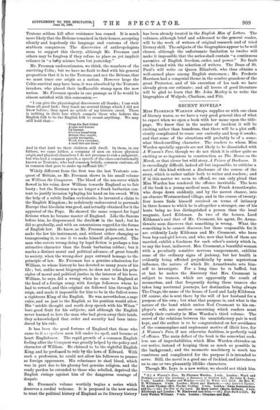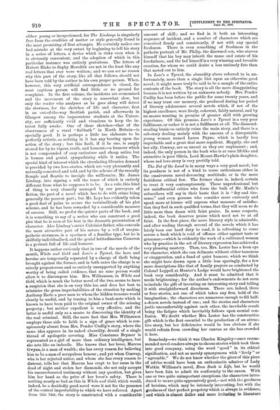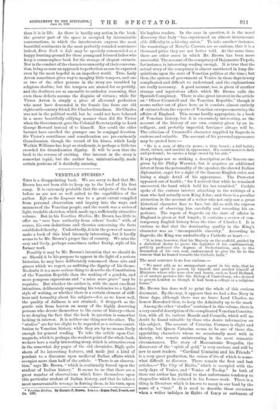RECENT NOVELS.*
Miss FLORENCE WARDEN always supplies us with one class of literary wares, so we have a very good general idea of what to expect when we open a book with her name upon the title- page. We know that in the matter of incident it will be exciting rather than humdrum, that there will be a plot suffi- ciently complicated to rouse our curiosity and keep it awake, and that some of the situations will probably be of a some- what blood-curdling character. The readers to whom Miss Warden specially appeals are not likely to be dissatisfied with A Woman's Face, though we do not think it is either quite so exciting or so ingenious in construction as The House on the Marsh, or that clever but wild story, A Prince of Darkness. It is exceedingly difficult, indeed all but impossible, to criticise a novel of this kind without a disclosure of the course of the story, which is rather unfair both to writer and readers ; and if in this matter we seem to offend, we can only plead that Miss Warden has rendered the offence inevitable. The hero of the book is a young medical man, Dr. Frank Armathwaite, who drops down suddenly, and. by the merest chance, into an obscure Westmoreland village, and in the course of twenty- four hours finds himself received on terms of intimacy in three houses to which he is altogether a, stranger, one of his hosts being no less distinguished a person than the local magnate, Lord Kildonan. In two of the houses, Lord Kildonan's and that of Mr. Crosmont, his agent, Dr. Arma- thwaite soon discovers that something is wrong. What the something is he cannot discover, but those responsible for it are evidently Lady Kildonan and Mr. Crosmont, who have been boy-and-girl lovers, and who, now that both of them are married, exhibit a. fondness for each other's society which is, to say the least, indiscreet. Mrs. Crosmont, a beautiful woman with a pecnliqrly sensitive nervous temperament, exhibits none of the ordinary signs of jealousy, but her health is evidently being affected prejudicially by some mysterious influence, the nature of which Dr. Armathvraite sets him- self to investigate. For a long time he is baffled, but at last he makes the discovery that Mrs. Crosmont is subject to trances, which are apparently the result of mesmerism, and that frequently during these trances she takes long nocturnal journeys, her destination being always The Crags, the name of the house of Lord and Lady Kildonan Of course, she is sent there by the will of her husband for a purpose of his own ; but what that purpose is, and what is the nature of the bond which unites Ned Crosmont to his em- ployer's wife, are matters concerning which readers must satisfy their curiosity in Miss Warden's third volume. The secret of the relations between the unsatisfactory pair is well kept, and the author is to be congratulated on her avoidance of the commonplace and unpleasant motive of illicit love, for A Woman's Face, if not otherwise faultless, is perfectly void of offence. The main defect of the book is the somewhat reck- less use of improbabilities, which Miss Warden obtrudes on our notice, instead of keeping them as much as possible in the background; and the mesmeric machinery is much too cumbrous and complicated for the purpose it is intended to serve. Still, the novel is a good one of its kind, and introduces us to one or two pleasantly lifelike characters.
Though Mr. Lays is a new writer, we should not think him
• (1.) A Woman's Face. By Florence Warden. 3 vols. London: Ward and Downey.—(2.) The Lincisays: a ROMAtICe of Scottish Life. By John K. Lop. 3 vols. London: Ohatto and Windus.—(3.) In White and Gold. By Mrs. F. H. Williamson. 3 vols. London : Hurst and Blackett.—(4.) Love's a Tyrant. By Annie Thomas (Mrs. Ponder endlip). 3 vols. London : Swan Sonnenschein and Co.—(5.) The Fat of the Land. By Mary Lester (Maria Bolters). 3 vols. Edinburgh apd London : W. Blackwood and Sons.—(6.) Even Bach is we. By Lady Watkin Williams. 8 vol.. London : Chapman and Hall. either young or inexperienced, for The Lindsays is singularly free from the crudities of matter or style generally found in
the most promising of first attempts. He certainly makes one bad mistake at the very outset by beginning to tell his story in a series of letters, a device which is risky even when it is obviously convenient, and the adoption of which in this particular instance was entirely gratuitous. The letters of Hubert Blake to Sophy Meredith are not in the least like any real letters that ever were written; and we can see no reason why this part of the story, like all that follows, should not have been told by the author in his own proper person. When, however, this very artificial correspondence is closed, the most captious person will find little or 'no ground for complaint. In the first volume, the incidents are economised and the movement of the story is somewhat slow, but only the reader who analyses as he goes along will detect the slowness, for the sketches of life and character, first in an out-of-the-way Scottish parish, and afterwards in Glasgow among the impecunious students at the Univer- sity, are sufficiently vivid and vivacious to keep the in- terest fully awake. One of these sketches—that of the observances of a rural " Sabbath " in North Britain—is specially good. It is perhaps a little too elaborate to be perfectly artistic, as nothing in it has any bearing upon the action of the story ; but this fault, if it be one, is amply atoned for by its vigour, truth, and humour,—a humour which is not compounded of easy caricature and cheap satire, but is human and genial, sympathising while it smiles. The special kind of interest which the circulating libraries demand is provided by two love-stories, which are very pleasantly and naturally conceived and told, and by the scheme of the rascally Semple and Beattie to inveigle the millionaire, Mr. James Lindsay, into signing a will the tenor of which is entirely different from what he supposes it to be. As a rule, this kind of thing is very clumsily managed by our purveyors of fiction, the part of a novel which has to do with crime being generally the poorest part; but Mr. Leys has evidently taken a good deal of pains to secure the verisimilitude of his plot scheme, and he has been rewarded by a considerable measure of success. Still, we prefer the quieter parts of the book, and it is something to say of a writer who can construct a good plot that he is seen at his best in the dramatic presentation of character. Alec Lindsay's strict Calvinist father, who conceals the most attractive part of his nature by a veil of unsym- pathetic sternness, is a specimen of a familiar type, but he is skilfully individualised, and the genial latitudinarian Cameron is a pertrait full of life and humour.
It happens rather curiously that in two of the novels of the month, White and Gold and Love's a Tyrant, the hero and heroine are temporarily separated by a charge of theft being brought against the former, and in both cases the charge is so utterly preposterous and so entirely unsupported by anything worthy of being called evidence, that no sane person would allow it to discompose him. Mrs. Williamson, in White and Gold, which is much the better novel of the two, seems to have a suspicion that she is on very thin ice, and does her best to minimise the gross improbabilities of the situation by making Anthony Earle a poor man to whom the hidden treasure would clearly be useful, and by tracing to him a bank-note which is known to have been paid to the original owner of the missing property ; but neither expedient is very effective, and the latter is useful only as a means to discovering the identity of the real criminal. Still, the mere fact that Mrs. Williamson employs these aids to faith is a sign of grace which is con- spicuously absent from Mrs. Pender Cudlip's story, where the same idea appears in its naked absurdity, devoid of a single thread of apologetic covering. Miss Constance Brymer is represented as a girl of more than ordinary intelligence, but she acts like an imbecile. She knows that her lover, Marcus Gwynn, is a man of wealth; she has every reason for believing him to be a man of scrupulous honour; and yet when Conway, who is her rejected suitor, and whom she has every reason to distrust, tells her that Marcus has crept to her room in the dead of night and stolen her diamonds, she not only accepts Ins uncorroborated testimony without any question, but gives him her hand as the price of her lover's safety. There is nothing nearly so bad as this in White and Gold, which would, indeed, be a decidedly good novel were it not for the presence of the central improbability to which we have referred. Apart from this blot, the story is constructed with a considerable
amount of skill ; and we find in it both an interesting sequence of incident, and a number of characters which are conceived firmly and consistently, if not with any special freshness. There is even something of freshness in the pathetic portrait of Mr. Philip, the disowned son, who starves himself that his boy may inherit the name and estate of his forefathers; and the lad himself is a very winning and loveable creation, for whom we could desire a less untimely fate than that meted out to him.
In Love's a Tyrant, the absurdity above referred to is, un- fortunately, more than a single blot upon an otherwise good novel ; it might more truly be said to be a sample of the entire contents of the book. The story is all the more disappointing because it is not written by an unknown nobody. Mrs. Pender Cudlip has been before the public for some twenty years, and if we may trust our memory, she produced during her period of literary adolescence several novels which, if not of the highest excellence, were lively, coherent, fairly natural, and by no means wanting in promise of greater skill with growing experience. Of this promise, Love's a Tyrant is a very poor fulfilment, or rather it is not a fulfilment at all. The diamond- stealing busin,,ss entirely ruins the main story, and there is a sub-story dealing mainly with the amours of a disreputable young woman named Laura Payne, which is hardly less improbable and a great deal more repellent. Happily, she and her ally, Conway, are as unreal as they are unpleasant ; and, indeed, the only person in the book who is at once lifelike and attractive is poor Olivia, Lord Mount-Hawke's plain daughter, whose sad love-story is very prettily told.
The Fat of the Land is in many ways a very good novel; but its goodness is not of a kind to rouse enthusiasm either in the omnivorous novel-devouring multitude, or in the more fastidious critical few. The former class is, indeed, certain to treat it very contemptuously. Those unprofessional but not uninfluential critics who form the bulk of Mr. Mudie's subscribers will say in their haste that it is "dry and tire- some," and even persons who consider more curiously and speak more at leisure will express what measure of satisfac- tion they feel in such qualified terms, that they will seem to do little more than damn with faint praise. In some respects, indeed, the book deserves praise which need not be at all faint. In the first place, the mere literary style is admirable, and after wading through several of the novels which it has lately been our hard duty to read, it is refreshing to come across a book which is void of offence either against taste or grammar,—which is evidently the work of a cultivated woman who by practice in the art of literary expression has achieved a very pleasing mastery. Then, too, Mrs. Lester has a keen eye for character, which she can delineate without either tameness or exaggeration, and a fund of quiet humour, which we think she might have drawn upon a little less sparingly, for a few more descriptions like that of family prayers as conducted by Colonel Leppell at Hunter's Lodge would have brightened the book very considerably. And it must be admitted that it needs brightening ; for the author's endowments do not seem to include the gift of inventing an interesting story and telling it with straightforward directness. There are, indeed, three or four stories, not one of which takes any firm hold of the imagination ; the characters are numerous enough to fill half- a-dozen novels instead of one; and the stories and characters jostle uncomfortably against each other, the inevitable result being the fatigue which inevitably follows upon mental con- fusion. We doubt whether Mrs. Lester has the constructive gift which is the first essential to the production of an attrac- tive story, but her deficiencies would be less obvious if she would refrain from crowding her canvas as she has crowded it here.
Somebody—we think it was Charles Kingsley—once recom- mended novel-readers always to choose stories which took them into good company, using the word " good " in its ethical signification, and not as merely synonymous with " lively " or "agreeable." We do not know whether the giver of this piece of advice would have been an enthusiastic admirer of Lady Watkin Williams's novel, Even Such is Life, but he would have been fain to admit its conformity to the canon. With one or two quite unimportant exceptions, the characters intro- duced to us are quite oppressively good,—not with the goodness of heroism, which may be intensely interesting, but with the goodness of that perfect propriety which is always in evidence, and which is almost duller and more irritating in literature than it is in life. As there is hardly any action in the book, the greater part of the space is occupied by interminable conversations, in which the interlocutors express the most beautiful sentiments in the most perfectly rounded sentences ; indeed, Even Such is Life may be specially commended as a happy hunting-ground for those young and leisured ladies who keep a commonplace book for the storage of elegant extracts. Nor is the conduct of the characters unworthy of their conversa- tion, being as near an approach to perfection as can be expected even by the most hopeful in an imperfect world. True, Lady Arvon sometimes gives way to naughty little tempers, and one or two of the other persons in the story are troubled by religious doubts ; but the tempers are atoned for so prettily, and the doubters are so amenable to orthodox reasoning, that even these defects assume the disguise of virtues ; while Sir Victor Arvon is simply a piece of all-round perfection who must have descended in the female line from our old eighteenth-century friend, Sir Charles Grandison. Sir Charles was not in the political world, but he could not have behaved in a more beautifully edifying manner than did Sir Victor when the Government gave the Colonial Secretaryship to Lord George Howard instead of to himself. Nor could the older baronet have excelled the younger one in conjugal devotion. Sir Victor's courtliness and consideration are pre-eminently Grandisonian, though the record of his kisses, which Lady Watkin Williams has kept so studiously, is perhaps a little too crowded for Grandisonian dignity. It will be seen that the book is the reverse of exciting. Our interest in the story is somewhat tepid ; but the author has, unintentionally, made certain portions of it decidedly amusing.




















































 Previous page
Previous page